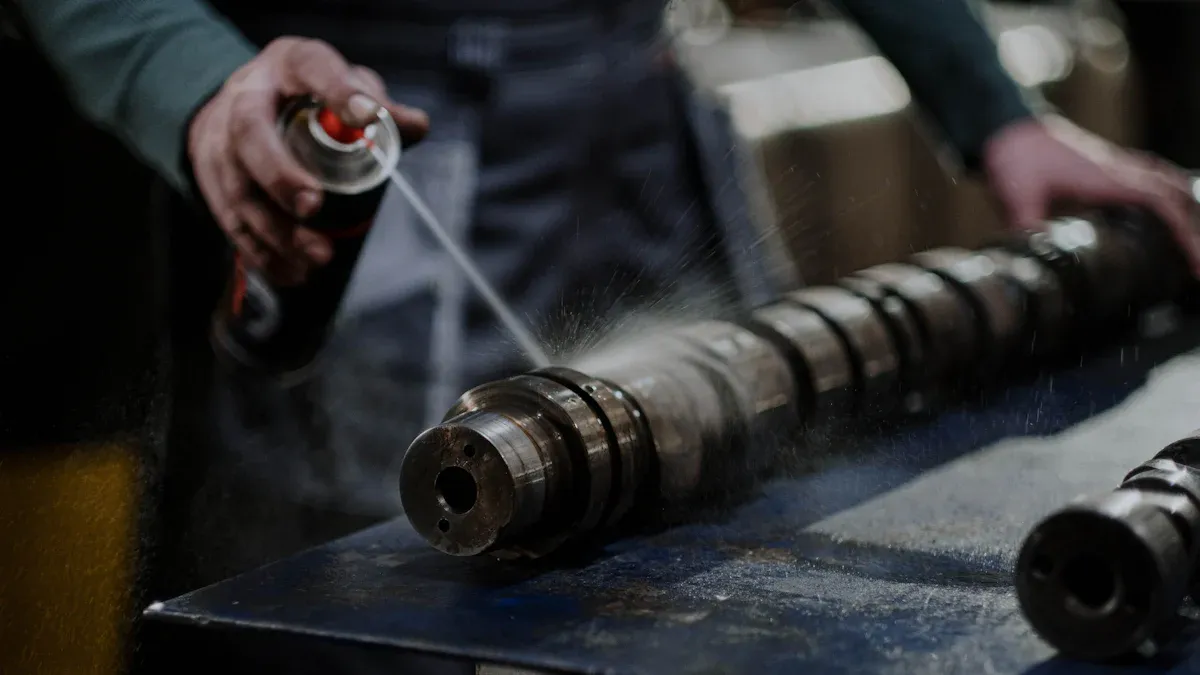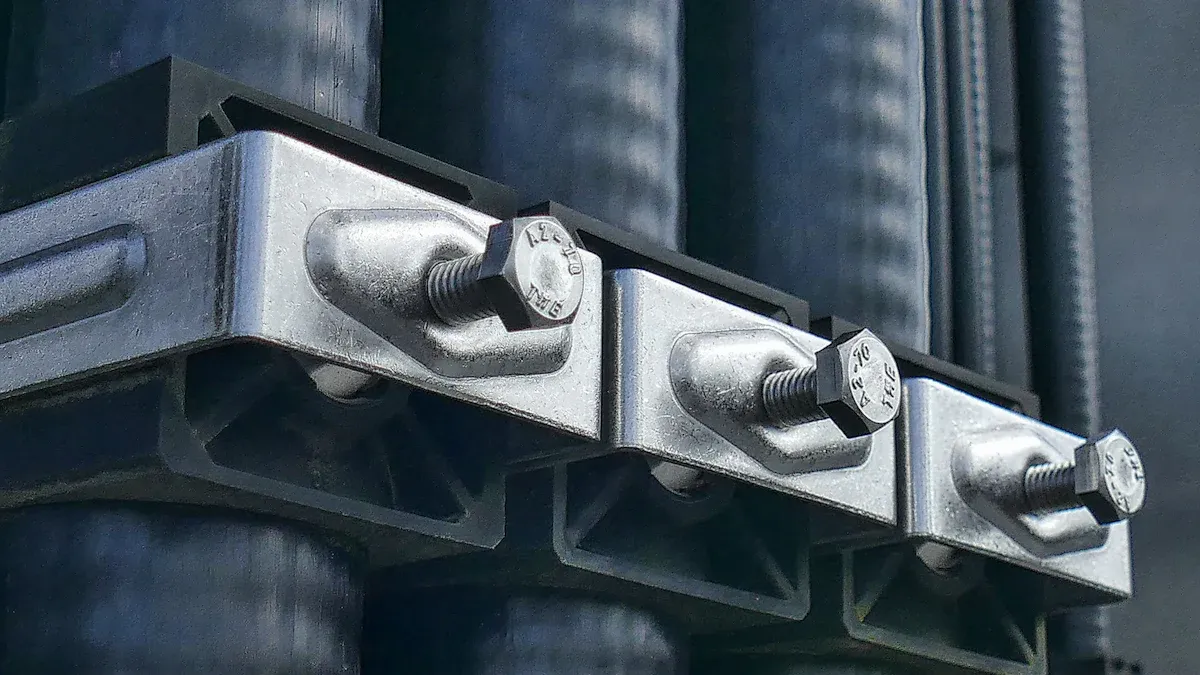
Stainless steel precision castings for automotive parts offer unparalleled benefits to the industry. The use of stainless steel car parts is essential due to their corrosion resistance, strength, and heat tolerance, making them vital for producing durable and high-performing components. With the global automotive stainless steel market expected to expand from $147.7 billion in 2023 to $216.5 billion by 2033, it’s evident that automakers are increasingly turning to this material. From exhaust systems to fuel tanks and battery enclosures for electric vehicles, stainless steel ensures reliability in extreme conditions. Additionally, its capacity to resist rust and absorb energy during crashes significantly enhances its attractiveness for safety-critical applications, particularly in investment castings vehicle parts.
Corrosion Resistance and Durability

How stainless steel resists rust and environmental damage
Stainless steel stands out in automotive manufacturing because of its exceptional ability to resist rust and environmental damage. This material forms a protective oxide layer on its surface, which prevents corrosion even when exposed to moisture, chemicals, or extreme temperatures. For example, exhaust systems made from stainless steel can endure high heat and corrosive gases, ensuring long-lasting performance. Similarly, stainless steel fuel tanks are non-permeable and durable, reducing the risk of leaks without needing additional protective coatings.
Automotive components often face harsh conditions, such as exposure to road salt, humidity, and fluctuating temperatures. Stainless steel thrives in these environments, maintaining its integrity and appearance over time. Its resistance to rust makes it a reliable choice for parts like trim, gaskets, and suspension systems, which are constantly exposed to the elements. By using stainless steel, manufacturers can ensure that vehicles remain functional and visually appealing for years.
Extending the lifespan of automotive components with stainless steel
The durability of stainless steel significantly extends the lifespan of automotive components. Parts made from this material can withstand wear and tear better than many alternatives. For instance, stainless steel precision castings for automotive parts, such as hose clamps and wiper arms, maintain their strength and functionality even after prolonged use. This durability reduces the need for frequent replacements, saving both time and money for vehicle owners.
Moreover, stainless steel components excel in environments where other materials might fail. High temperatures, exposure to harsh chemicals, and constant moisture are no match for stainless steel. This resilience ensures that critical parts, like exhaust systems and fuel tanks, remain operational under extreme conditions. By choosing stainless steel, automakers can deliver vehicles that perform reliably and require less maintenance over their lifespan.
Strength, Heat Resistance, and Performance

Mechanical strength and energy absorption for safety
Stainless steel offers exceptional mechanical strength, making it a top choice for safety-critical automotive parts. Its ability to absorb energy during impacts enhances crashworthiness, protecting passengers in collisions. This material deforms in a controlled manner, reducing the force transferred to occupants. For example, high-strength stainless steel is often used in chassis components to improve crash resistance.
| Property | Description |
|---|---|
| Tensile Strength | 304 stainless steel exhibits a tensile strength of approximately 515 MPa (74,700 psi). |
| Yield Strength | Yield strength is around 205 MPa (29,700 psi) for 304 stainless steel. |
| Toughness | High toughness, capable of absorbing significant energy before breaking. |
| Fatigue Resistance | Good fatigue resistance, suitable for components experiencing cyclic stresses. |
These properties ensure that stainless steel precision castings for automotive parts deliver both safety and durability.
Reliability in high-temperature environments
Automotive components often face extreme heat, especially in areas like exhaust systems and catalytic converters. Stainless steel resists oxidation and corrosion at high temperatures, maintaining its structural integrity. Austenitic grades, such as 304 and 310, perform exceptionally well, retaining their toughness even under thermal shock. This makes them ideal for parts exposed to temperatures exceeding 800°C, ensuring reliability in demanding conditions.
Maintaining performance under extreme conditions
Whether in racing or off-road environments, stainless steel excels. Its durability reduces maintenance needs, while its energy absorption properties enhance safety. Components like exhaust systems and fuel tanks benefit from its strength-to-weight ratio and resistance to harsh conditions. This ensures vehicles perform consistently, even in the most challenging scenarios.
Precision, Formability, and Sustainability
Adaptability for intricate automotive designs
Stainless steel’s formability makes it a perfect match for intricate automotive designs. Its excellent cold-working properties allow manufacturers to create complex shapes and components with ease. This flexibility supports innovative designs, enabling the production of thinner, lightweight parts without compromising strength or safety. For instance:
- Advanced grades of stainless steel help reduce vehicle weight while maintaining crash performance.
- Its ductility ensures that even the most detailed design elements, like decorative trims or structural reinforcements, are achievable.
Additionally, stainless steel precision castings for automotive parts meet the demands of modern vehicles, whether they are electric, hydrogen-powered, or traditional combustion engines. Its durability and resistance to corrosion make it a reliable choice for both functional and aesthetic components.
Efficiency in manufacturing complex components
Stainless steel simplifies the production of complex automotive parts. Precision casting techniques, such as CNC machining and grinding, ensure tight tolerances and high accuracy. This is especially important for components like catalytic converters, mufflers, and battery enclosures in electric vehicles. Some examples include:
- Exhaust Systems: Over 60% of automotive exhaust systems use stainless steel for its durability and heat resistance.
- Fuel Tanks: Stainless steel’s non-permeability reduces leak risks, enhancing safety and sustainability.
- Chassis Components: Its strength improves crash resistance, ensuring passenger safety.
These manufacturing efficiencies save time and resources, making stainless steel an economical choice for automakers.
Environmental benefits and recyclability of stainless steel
Stainless steel stands out as an environmentally friendly material in automotive manufacturing. Its recyclability rate exceeds 85%, and it is 100% recyclable, often containing significant recycled content. This reduces the demand for raw materials and lowers energy consumption during production. Additionally:
- Vehicles using stainless steel weigh about 10% less, improving fuel efficiency by roughly 5%.
- Lower fuel consumption leads to reduced carbon emissions, supporting sustainability goals.
By choosing stainless steel, automakers contribute to a greener future while maintaining high performance and durability.
Stainless steel precision castings for automotive parts offer unmatched advantages. Their durability reduces maintenance costs, while corrosion resistance extends vehicle lifespan. Compared to alternatives, stainless steel excels in forming, crash safety, and recyclability. Though initial costs are higher, long-term savings and sustainability make it the ideal choice for modern automotive manufacturing.
FAQ
What makes stainless steel precision castings better than other materials for automotive parts?
Stainless steel offers superior corrosion resistance, strength, and recyclability. These qualities make it ideal for durable, high-performance automotive components that last longer and reduce maintenance costs. 🚗
Are stainless steel automotive parts environmentally friendly?
Yes! Stainless steel is 100% recyclable and often contains recycled content. Its durability also reduces waste, making it a sustainable choice for eco-conscious automakers. 🌱
Can stainless steel precision castings handle extreme conditions?
Absolutely! Stainless steel resists high temperatures, harsh chemicals, and moisture. It performs reliably in demanding environments, ensuring safety and durability for critical automotive parts. 🔥
